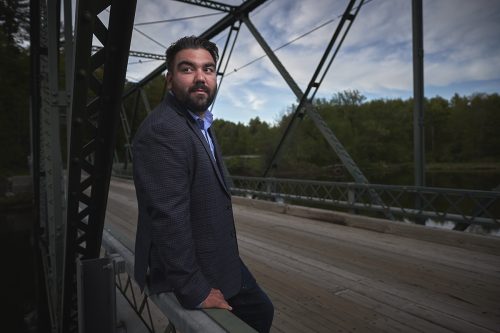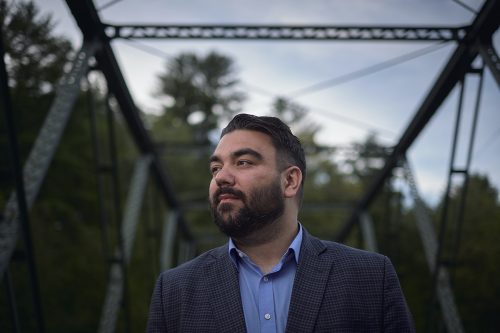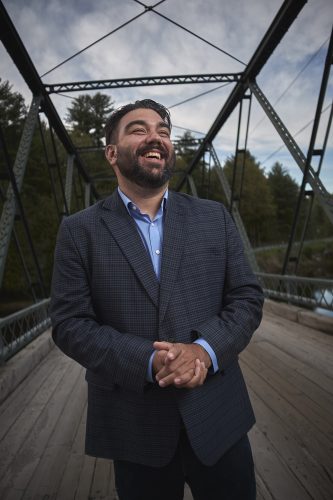James Chase Sanchez’s Documentary Airs on PBS
Documentary filmmaker and alumnus wins an award for Man on Fire.
James Chase Sanchez’s Documentary Airs on PBS
Documentary filmmaker and alumnus wins an award for Man on Fire.
Growing up in the small East Texas town of Grand Saline, James “Chase” Sanchez ’17 PhD didn’t pay much attention when he was called a “wetback” or even when he joined in the football team’s rally chant: “We’re all right cuz we’re all white.”

James “Chase” Sanchez is an assistant professor of writing and rhetoric at Middlebury College in Vermont. Photo by Brett Simison
Reading scholarship on race and rhetoric in grad school opened his eyes, and he became more outspoken.
Sanchez didn’t know the Rev. Charles Moore. But when the elderly white minister self-immolated in Grand Saline (located 70 miles east of Dallas) to protest the town’s culture of racism, Sanchez felt a connection. “When Charles Moore killed himself on June 23, 2014, and I read about what happened, I was stunned that someone would go through this. I immediately knew that if there was one story I had to tell in my life, this was the story because there wasn’t much news coverage.”
The story became the basis of Sanchez’s dissertation and then a documentary Sanchez produced. Man on Fire premiered at the Slamdance Film Festival, won an International Documentary Association Award and packed a lecture hall at TCU in March 2018. That same year, PBS broadcast the film nationwide on Dec. 17 as part of its Independent Lens series.
“I hope what our film really sparks is a conversation of ways we talk about race and move past our own preconceived biases and ideologies and try to have real, honest conversations,” said Sanchez, assistant professor of writing and rhetoric at Middlebury College in Vermont.
Through his experiences as researcher, cultural rhetorician professor and now documentary producer, Sanchez has picked up a wealth of powerful life lessons.
We all have stories to tell. And we need to tell those stories. I believe we are moved by storytelling. That’s the way we understand the world and how we emotionally connect with people.
Realize that words matter. The way we talk about things, the words we use in describing our own ideologies, our perspectives, our beliefs — they matter and can be interpreted in so many different ways. The words we bring into any conversation have power, and we need to understand that in order to have difficult conversations.

PBS broadcast Sanchez’s documentary as part of its Independent Lens series. Photo by Brett Simison
Our context matters. The way I became interested in race and the way people talk about race was a direct correlation to my upbringing in an environment that wasn’t very racially progressive. People used the N-word on a daily basis. I became interested in the subject because I wanted to change my environment. Finding your passion comes from your own upbringing but also how you can take your education and make an actual difference in your own community.
Race matters. We live in an American society where we want to feel that — in Martin Luther King Jr.’s words — none of us should be judged by the color of our skin. That’s a very hopeful ideology, but it’s not reality. Why race matters is race is written onto people. Race is an integral part to your identity. Before we can get to a point where we’re in this post-racial society, we have to understand that race means identity for people of color.
Read everything. What was helpful in producing this film, and writing in general, was the ability to make all these connections because of stuff that I’ve read before — through research and through reading fiction. Whenever you have a chance to sit down and read a book, it doesn’t matter if it’s fiction or nonfiction, there’s so much knowledge you’re getting that can help you in any sort of artistic sense.
The best advice I have for writing is to write without editing or revising. A lot of us, we write a sentence and then we want to look over that sentence and ask if this dependent clause works or do I need a comma here, yada, yada. I know writers who can take hours to write just a few paragraphs because they spend so much time trying to perfect every sentence. The best way to become a good writer is just to put words on paper and then when it’s done, go back and revise and edit. Don’t revise and edit in the moment. Wait until you have a complete draft.
The best work doesn’t happen in a day. That is something I learned as a student and as a professor. As a student, I was one of the ones who sometimes waited until the last minute to write a paper. And I realized that was not the best strategy. Being a writing professor, I know it’s absolutely a truth that if you take 20 minutes a day over a week rather than three hours on a Sunday night to finish a paper, the writing will be much better. A little work a day is better than a lot of work in a small amount of time.

Sanchez’s documentary “man on Fire” won an International Documentary Association Award. Photo by Brett Simison
The best stories are made through teamwork. As someone who does a lot of writing, I always thought of it as a solo act. The writer goes about and does everything. The director puts everything together. That’s not the way either one of those work. For the film, it took so many people. When it comes to writing, it takes so many people reading your work and commenting on your work. When it comes to the process of making something artistic, it takes teamwork.
Whatever your dreams are, you just have to take that step forward to achieve them. I wasn’t the most prepared college student. Even in my first few years of college, I maybe spent more time on the partying side than the educational side, but when I became invested with what I wanted to do with my life, that really empowered me to achieve my goals. I made all the necessary steps to make A’s to be able to go to grad school. Find your dreams and really be able to move toward them.
For students, be willing to take a course that might make you uncomfortable. Be able to take that step and say, “I would like to learn about someone else’s culture. I would like to be able to participate in conversations I wouldn’t be able to have in my everyday life.” Take those risks and chances when it comes to your coursework. Know that it’s not just about your degree — it’s what you learn.
— As told to Rachel Stowe Master
Edited for clarity and length.

Your comments are welcome
Comments
Related reading:
Campus News: Alma Matters
Race, Ethnicity and Politics and Texas
With the 2016 release of his first book, Max Krochmal stepped into the national spotlight as an authority on social justice and activism in the Lone Star State.
Alumni
Ron Hall’s True Calling
An art dealer’s story of friendship takes on a life of its own as a movie, Same Kind of Different As Me, now in theaters.
Features
‘Come From Away’ Inspiration Beverley Bass Tells Her Story
An American Airlines pilot got diverted on 9/11, and her story has landed on Broadway.